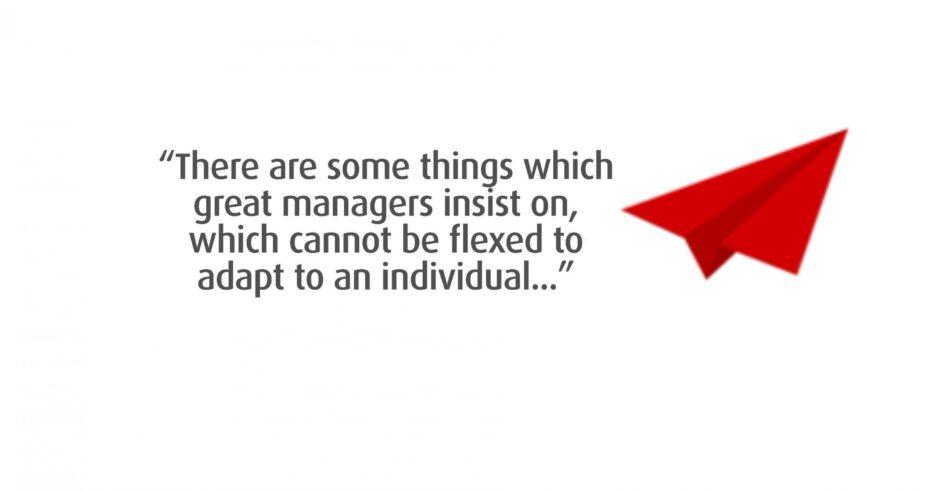One of the more subtle challenges for people who want to be great managers is the need to balance two things that are apparently in opposition with each other. Agile and steadfast. Encouraging and tough on poor performance. Coaching and directing. Holding people to account and encouraging risk taking. Great managers are skilled at successfully doing both things, rather than choosing one or the other.
One of my favourites is the need for adaptability to individuals and driving collective standards. Managers need to be flexible in their style, to adapt to the needs of each person on the team by adjusting to their individual circumstances, experience, skills and attitude. A bold and confident team member needs a different approach from their manager to a timid and anxious one. Someone who knows the job inside-out needs a different things to a person who is new to the role. An ambitious team member needs different conversations to someone who is comfortable with the rate of their progression. So effective managers adapt their approach to get the best from the individual in front of them, and they know that individuals are different.
This is especially so as the individual employee experience become central to our organisations and the people who work in them. A manager who cannot adapt their style to the individual needs and expectations of team members will be increasingly isolated as we recognise that treating people like people is the right and best thing to do to create successful outcomes.
But adaptability and flexibility must only go so far. There are some things which great managers insist on, which cannot be flexed to adapt to an individual. Some things are so important they cannot be altered no matter how much individuals might welcome that. For example, reaching high standards of performance should be non-negotiable – not reaching impossible standards, but reaching high standards and delivering on promises – and this is something great and effective managers insist on. They will work with the individuals to coach, or encourage, or celebrate, or train – but they will still insist on high standards. No one gets a pass on doing great work. Being a positive team member is the same – great managers do not allow individuals on the team to undermine colleagues, or bully people, or play games. Why? Because productive teams work collaboratively and individuals trust and rely on each other; this cannot happen if the manager accepts poor behaviour. And of course, being honest and acting with integrity and fairness are clear non-negotiables for all great managers.
So the trick here is to do both things. To adapt to the individual needs of team members, and to be clear and transparent about the non-negotiables.
And there are two keys here.
Firstly, know what you think. Meaning, look hard at the people who work for you, what they are good at (and less good at) and where they are in their performance, productivity and career journey. Then decide what you think each of them needs from you in order to succeed and thrive. You need to do this thinking, this assessment, in order to deliberately and clearly adapt your approach to maximise their success and help them get the most from themselves. Don’t skip this – intentionally managing each individual is critical. Similar, you must decide what your own “red lines” are, the things that will define your team and the standards of performance and behaviour that you will insist on. Don’t skip this either: it needs some reflection and some deliberation, probably some discussion with people you trust; but you must decide for the team you lead what you will insist on, what cannot be adjusted, what your non-negotiables are.
Secondly, lean hard on transparency and open communication. Great managers are always highly communicative, in their own way and with their own style, and their people know where they stand on all kinds of things. So you need to be open individually – one on one – with each team member on your assessment of them and how you are adapting to help them succeed and grow (That’s a big conversation – several conversations – and will be a topic for a deep dive in other article). And you need to be open with the entire team about your “red lines” and the thinking behind them. The best managers are really transparent with their expectations of the team and of each individual on it and they discuss this, explain this, repeat this. They set out what they expect clearly, explain why it matters, repeat if often, and do not waver. Everyone knows what that means and as a result, the non-negotiables are not a surprise to team members: they are known, consistent and clear.
So, my question to you: are you effectively adapting to the needs of each individual on your team, and being really clear and consistent about your own non-negotiables. To be a great manager, you need to be doing both.
My first book, The Self Determined Manager, is a handbook for every manager, regardless of your level and experience. I wrote it to help you to be the best manager you can be, and it stands as a practical guide for every manager and as a manifesto for how management should be done across the world. Available on Amazon.com and Amazon.co.uk. More details at the Self Determined Manager website


